
Magento Enterprise Hosting Partners: How to Choose Your Magento Host
Magento Enterprise Hosting Partners offer improved security and performance for your store. Wondering how these partners can enhance your platform? This article guides you on selecting the right hosting partner that aligns with your technical requirements
-
Significance of Magento Enterprise Hosting for High-Revenue Stores
-
15 Must-Have Developer-Friendly Features of Magento Enterprise Hosting
-
Magento 1 vs. Magento 2 Platform: Enterprise Hosting Compatibility
-
How does Magento Enterprise Hosting support PCI audits and monitoring?
-
What backup and recovery features are available in Magento Enterprise Hosting?
Key Takeaways
-
Discover the significance of Magento Enterprise Hosting for high-revenue stores.
-
Learn about the key features and benefits of Magento Enterprise hosting.
-
Understand the importance of dedicated support and customization options for tailored e-commerce experiences.
-
Explore developer-friendly features such as Git integration, staging environments, and CLI access for efficient management.
-
Learn about the migration process from Magento 1 to Magento 2 hosting environments for a seamless upgrade of your Magento site.
-
Discover the best Magento Enterprise hosting partners of 2024, with details on their features and pricing options.
Significance of Magento Enterprise Hosting for High-Revenue Stores
-
Scalability: Hosting providers seamlessly handle surges in traffic and transactions, ensuring your store remains responsive during peak periods.
-
Performance Optimization: They utilize advanced caching and database optimization strategies to speed up page loads and reduce server response times for Magento sites.
-
Enhanced Security: Hosting partners also provide state-of-the-art robust security. They perform timely scans, optimize firewalls, and protect against DDoS attacks to secure your data and customer information.
-
Dedicated Support: Offers 24/7 access to Magento-certified developers for immediate assistance with technical issues, even for emergency platform-side maintenance.
-
Customizability: Extensive customization and integration capabilities allow a tailored e-commerce experience to meet your unique business needs.
-
Compliance: Stringent compliance with PCI DSS and other regulatory standards aids in securely processing and storing payment information.
-
High Availability: Enterprise hosting providers implement redundancy and failover systems to guarantee uptime. It boosts your store’s accessibility.
-
Advanced Analytics: The best hosting partners provide customized server-centric tools for deeper insights and data-driven decision-making. You can use these to monitor your Magento store performance, customer behavior, and operational efficiencies.
-
Global CDN: Global Content Delivery Networks decrease load times for international customers, improving your site's user experience and conversion rates.
-
Managed Updates: Fully managed hosting includes updating Magento security patches and upgrades. It ensures your store remains current and secure without requiring direct involvement.
15 Must-Have Developer-Friendly Features of Magento Enterprise Hosting
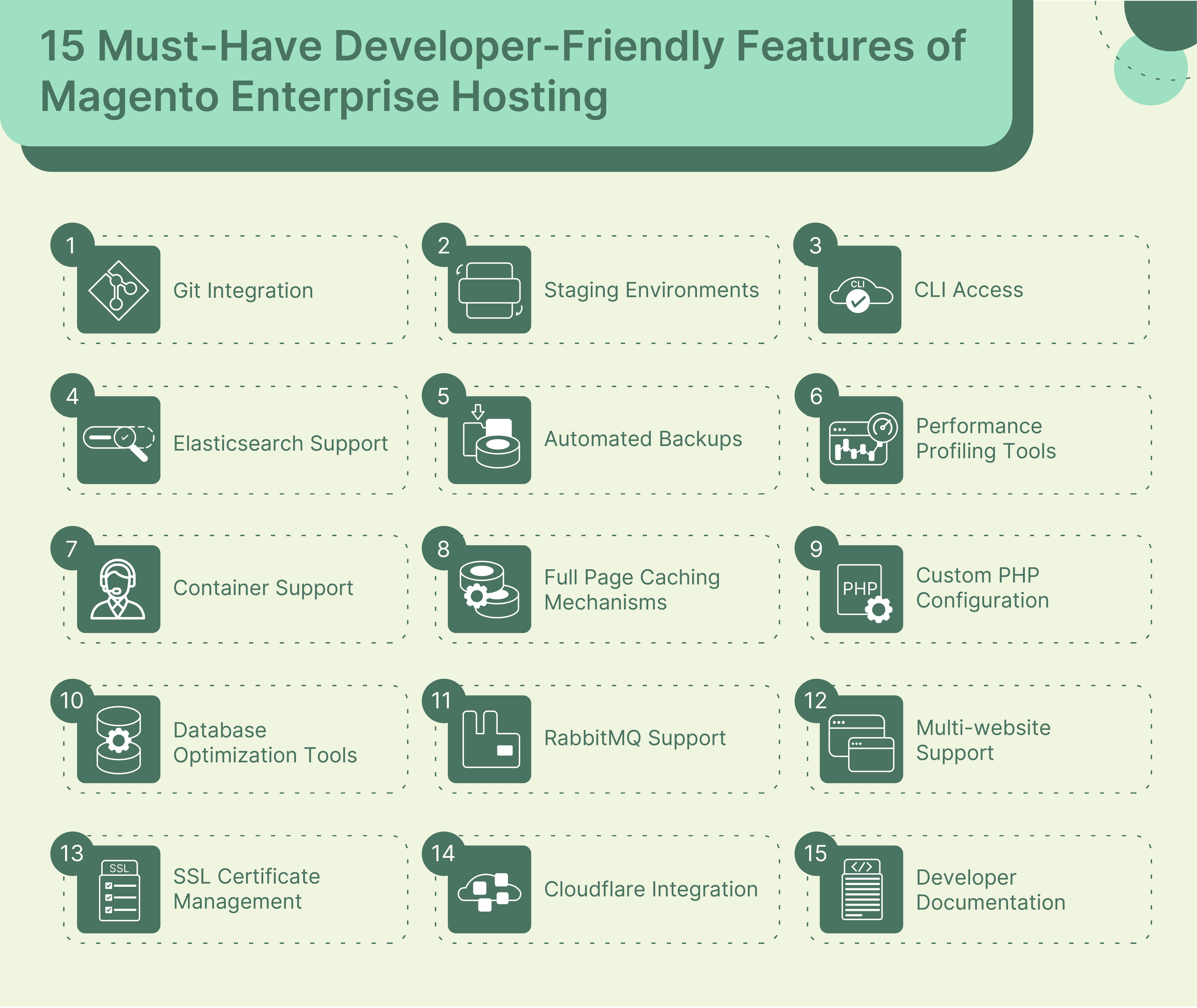
1. Git Integration
Streamline version control and collaboration with built-in Git integration, facilitating code management and deployment processes.
2. Staging Environments
Test updates and new features in a secure staging environment before going live, minimizing disruptions to your live store.
3. CLI Access
Gain command-line interface access for direct interaction with your server, offering greater control over your environment.
4. Elasticsearch Support
Enhance search capabilities with Elasticsearch, improving search performance and relevance for your users.
5. Automated Backups
Ensure data integrity with scheduled, automated backups, allowing for easy restoration if needed.
6. Performance Profiling Tools
Access tools like New Relic or Blackfire to profile your application's performance and identify bottlenecks.
7. Container Support
Utilize Docker or other container technologies for consistent, efficient, and scalable application deployment on Magento hosting platforms.
8. Full Page Caching Mechanisms
Implement Varnish and Redis for faster page loading times and improved overall site performance. Utilize built-in full-page caching to impact user experience and SEO rankings directly.
9. Custom PHP Configuration
Customize your PHP settings to optimize performance and compatibility with your Magento application.
10. Database Optimization Tools
Use tools and scripts to optimize database performance, ensuring swift and efficient data retrieval.
11. RabbitMQ Support
Integrate with Magento RabbitMQ for advanced message queue management, enhancing asynchronous communication and process efficiency.
12. Multi-website Support
Manage multiple websites or storefronts from a single Magento installation, with hosting configurations optimized for multi-site setups.
13. SSL Certificate Management
Easy management and renewal of SSL certificates, ensuring secure data transmission.
14. Cloudflare Integration
Leverage Cloudflare for additional security layers, DDoS protection, and content delivery network benefits.
15. Developer Documentation
Access comprehensive documentation and resources specifically designed to aid developers in maximizing your Magento hosting environment.
Magento 1 vs. Magento 2 Platform: Enterprise Hosting Compatibility

Magento 2 is designed for extensive performance and demands more from hosting environments than Magento 1. For developers, Magento 2 introduces improved coding standards. It requires a streamlined customization process through its modular architecture and integrated testing frameworks that facilitate higher-quality code and easier maintenance. Step-by-step migration to a compatible Magento 2 hosting environment involves:
1. Evaluating Hosting Requirements
Assess Magento 2's requirements against your current hosting environment and your exact business scaling needs. Focus on the PHP version, database support, and server technologies.
2. Choose a Magento 2-Compatible Host
Select a hosting provider specializing in Magento 2, considering factors like performance, scalability, and security features.
3. Prepare Your Magento 2 Environment
Set up a Magento 2 instance in your new hosting environment, i.e., all the necessary components for Magento to operate. It involves the core software, database, associated files, configurations, and any additional modules or extensions.
4. Data Migration
Use Magento's Data Migration Tool to migrate data from your Magento 1 store to Magento 2. It includes products, customers, orders, and configurations.
5. Theme and Customization Migration
Migrate or rebuild your theme and customizations for Magento 2, leveraging its new technologies and architecture.
6. Extension Migration
Replace or migrate extensions, ensuring they are compatible with Magento 2. It might involve working with extension providers or developing custom solutions.
7. Testing
Thoroughly test your Magento 2 environment, including performance, functionality, and security testing, to ensure everything works as expected.
8. Going Live
After extensive testing, switch your DNS settings to point to your new Magento 2 hosting environment, effectively going live with your upgraded store.
Best Magento Enterprise Hosting Partners in 2024
1. MGT-Commerce – Best AWS Cloud Expertise
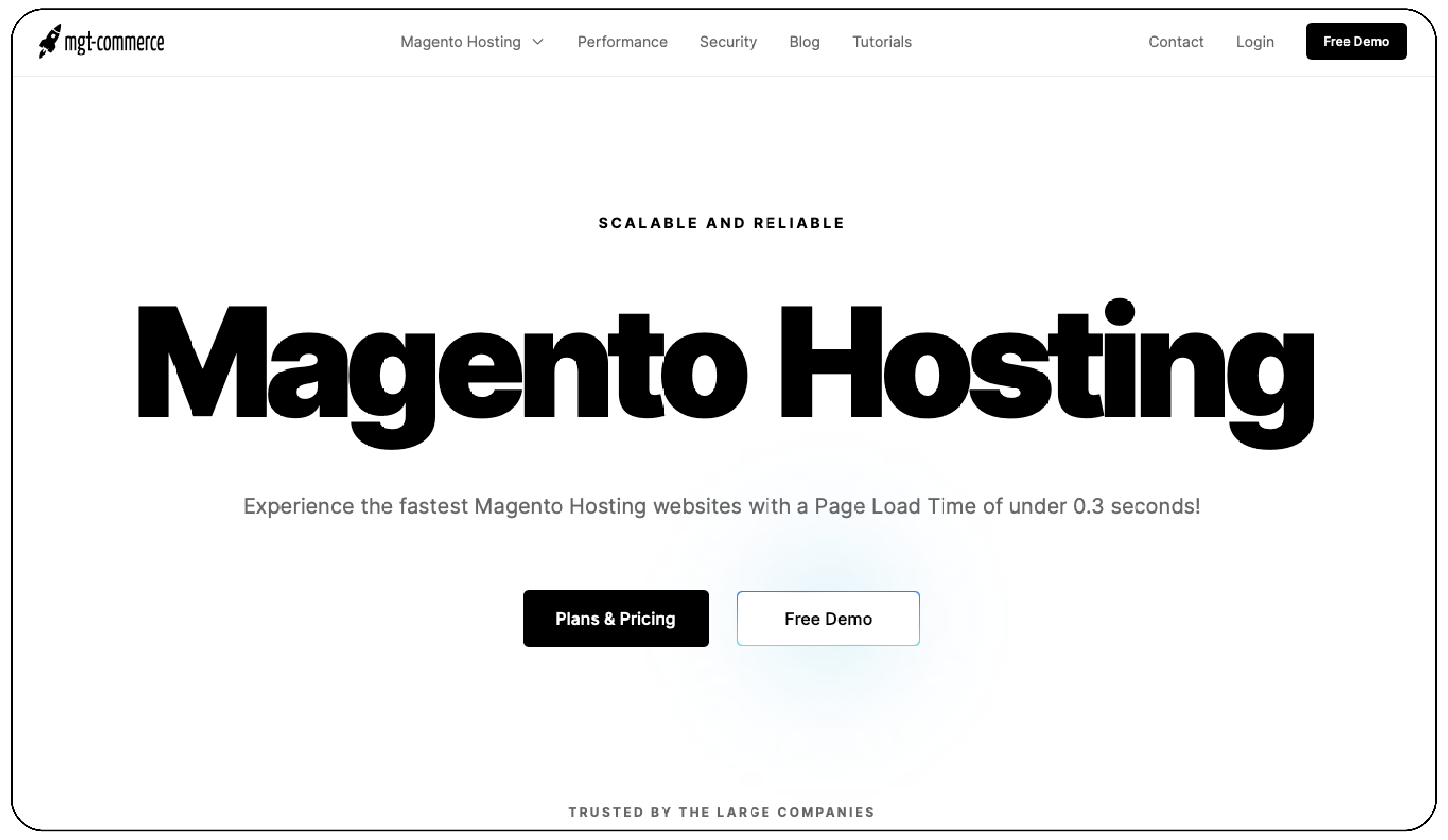
MGT-Commerce excels in providing AWS cloud-based Magento hosting solutions, emphasizing speed, scalability, and security. Its platform is optimized for Magento, delivering top-notch performance through a dedicated cloud environment.
Key Features:
-
Auto-scaling capabilities ensure your Magento store can efficiently handle varying load levels.
-
A fully managed service that includes updates, security patches, and technical support.
-
High-performance setups with Varnish, Redis, and Elasticsearch to speed up your store.
-
Global CDN integration to reduce load times for users worldwide.
-
Free migration assistance
Pricing:
-
Single Server Plans: Prices start at 149€/month for Premium, targeting small businesses, and go up to 249€/month for Enterprise, aimed at performance enthusiasts.
-
Multi-Server Hosting: Basic plans begin at 299€/month, Premium at 499€/month, and Ultimate at 999€/month. Setup fees are extra.
-
Auto Scaling Plans: Basic plans are 1499€/month, Premium at 1999€/month, and Enterprise at 4999€/month, each with a 499€ setup fee. AWS charges are extra.
2. Nexcess – Best for Performance Optimization
Nexcess is highly regarded for its focus on performance optimization and scalability, making it a perfect match for Magento merchants looking to enhance their store's speed and reliability. Specializing in Magento hosting, Nexcess offers solutions that are fine-tuned for Magento-specific requirements.
Key Features:
-
Automated scaling to handle traffic spikes without impacting site performance.
-
Built-in monitoring tools for real-time insights into site performance and security.
-
Daily backups and easy restoration options to safeguard your data.
-
Enhanced security protocols, including malware scanning and removal to protect your store.
Pricing:
-
XS Plan: $37.20 for the first three months, then $62.00/month. Includes 50GB storage and 1000GB bandwidth and supports up to 11 sites.
-
Mid-Range Plans (S, M, L): Start at $68.40 for S, $116.40 for M, and $195 for L for the first three months, then $114.00, $194.00, and $325.00/month, respectively. S to L plans scale from 75GB to 400GB storage, 2TB to 5TB bandwidth, and support 16 to 31 sites.
-
High-End Plans (XL, XXL): XL at $352.80 and XXL at $542.40 for the first three months, then $588.00 and $904.00/month. They offer 600GB to 800GB storage and 8TB to 10TB bandwidth and can handle 41 to 51 sites, featuring enhanced CPU and RAM for high performance.
3. SiteGround – Best Affordable Shared Plans

SiteGround is popular for its affordable shared hosting solutions. It simplifies Magento hosting with automatic installation and offers competitive pricing across its hosting plans, including custom enterprise solutions.
Key Features:
-
StartUp plan supports one website, offers 10GB of disk space, and includes daily backups and a free site builder.
-
GoGeek plan provides staging environments and Git version control for development teams.
-
Cloud hosting scales up to 8 CPU cores, 10GB memory, and 120GB SSD storage.
Pricing:
-
StartUp Plan: Monthly rates start at $24.99, decreasing to $14.99/month for a 24-month prepayment. Prices vary by currency, offering lower rates for longer commitments.
-
GrowBig Plan: It begins at $34.99/month and is reduced to $24.99/month when prepaid for 24 months. Available in different currencies, with discounts for extended prepayments.
-
GoGeek Plan: The initial monthly fee is $49.99, with a reduction to $39.99/month for a 24-month plan. Pricing is consistent across 1-month and 3-month periods, with lower rates for annual and biennial commitments.
4. HostPapa – Best for the Self-Sufficient

HostPapa stands out for its affordability and reliable Magento hosting on shared, enterprise, reseller, and cloud plans, offering Magento 2.0, with VPS and dedicated plans upgrading to Magento 2.1. It’s praised for generous disk space and diverse hosting types.
Key Features:
-
Starter plan includes essentials like free website transfer, Cloudflare CDN, free SSL via Let’s Encrypt, and cPanel.
-
Offers one-on-one training, 24/7 support, and a 30-day money-back guarantee.
-
Starter package allows hosting up to 2 websites with 100GB of disk space.
-
VPS plans prioritize security with network monitoring, brute force detection, and a firewall.
Pricing:
-
Shared plans start at $2.75/month.
-
VPS plans range from $19.99/month to $249.99/month, scaling from 4 CPU cores and 60GB SSD storage to 12 CPU cores and 1TB SSD storage.
5. InMotion – Best for Scalability
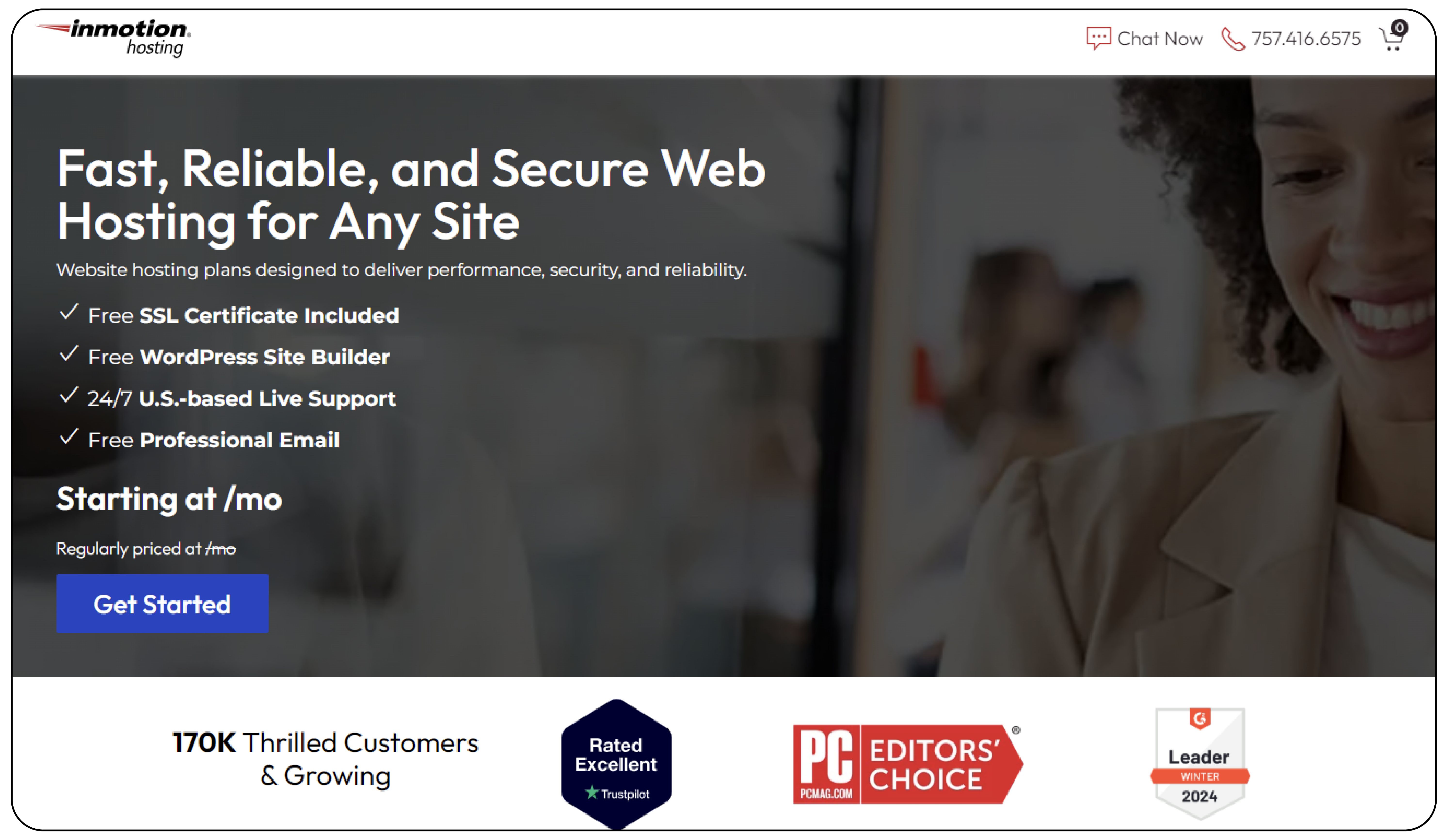
InMotion is renowned for advanced features and support, offering various hosting services from basic shared to dedicated servers. It’s ideal for scalable Magento hosting with tailored plans for growing businesses.
Key Features:
-
Shared hosting includes a free domain, drag-and-drop builder, and strong security features like free SSL and DDoS protection.
-
Managed VPS hosting offers advanced server management and “Max Speed Zones” for optimal data center location.
-
Dedicated hosting provides multi-layer security and faster loading times with free SSD.
Pricing:
-
Dedicated Server Plans: Range from Aspire at $45.00/mo to CC-3000 at $799.99/mo, offering varying specs from 16GB to 512GB RAM, 1TB SSD to 3.2TB NVMe SSD. and Intel® Xeon® processors suited for different business sizes and needs, with features like free migration, security suites, and backup storage included.
-
VPS Hosting Plans: Start at a promotional rate of $0.99/mo for the first term, then regular rates from $54.99/mo to $197.99/mo, featuring 4GB to 32GB RAM, 90GB SSD to 540GB NVMe SSD, and varying vCPU cores.
How does Magento Enterprise Hosting support PCI audits and monitoring?
Enterprise Hosting ensures PCI compliance through rigorous audits and monitoring, securing your e-commerce platform's payment processes. The monitoring process involves:
-
Regular Scans and Audits: Your hosting environment undergoes regular PCI compliance scans and audits. It helps identify potential vulnerabilities and ensures adherence to security standards.
-
Secure Data Handling: Encrypted data transmission and storage mechanisms protect sensitive customer information during transactions. Such involves data related to payment methods, purchase history, shipping addresses, and order statuses.
-
Access Control: Strict access controls limit entry to sensitive data, allowing only authorized personnel to manage payment processing systems.
-
Log Management: Comprehensive logging of access and changes helps track user activities, facilitating audits and detecting unauthorized access attempts.
-
Compliance Assistance: Hosting providers sometimes offer additional guidance in solving PCI DSS issues like API disputes and payment gateway integration.
What backup and recovery features are available in Magento Enterprise Hosting?
Magento Enterprise Hosting provides advanced backup and recovery features to protect your e-commerce data. Services include automated daily backups of your store's data (products, customer information, and transaction records), which are securely copied and stored offsite. In case of data loss/corruption, performing point-in-time recovery restores your store to an instance before the issue occurs.
Additionally, the hosting provides incremental backup options, which means only changes made since the last full backup are saved, optimizing storage use and reducing recovery time. Real-time backup solutions are also available for high-demand scenarios, capturing data as it changes to minimize data loss.
These features are managed through a user-friendly control panel, giving you direct control over backup schedules and recovery processes. It ensures that your Magento store remains resilient when faced with data challenges.
Future Quality Magento Hosting Trends
1. Multi-cloud Strategies

Magento hosting will embrace multi-cloud strategies, allowing merchants to distribute their e-commerce platform across multiple cloud services. This approach enhances reliability, avoids vendor lock-in, and optimizes performance by leveraging the strengths of different cloud providers.
A point to remember, though, is that handling diverse APIs, tools, and costs of multiple cloud providers complicates management. It often leads to costly, suboptimal deployments and requires specialized skills to handle increased operational complexities.
2. AI and Machine Learning Integration

Hosting services will integrate AI and machine learning for predictive analytics, automated issue resolution, and enhanced customer insights. Such will provide personalized experiences for your customers and proactive maintenance for your site. AI-driven security monitoring measures will protect your Magento website from emerging threats, keeping customer data safe.
3. Serverless Architectures
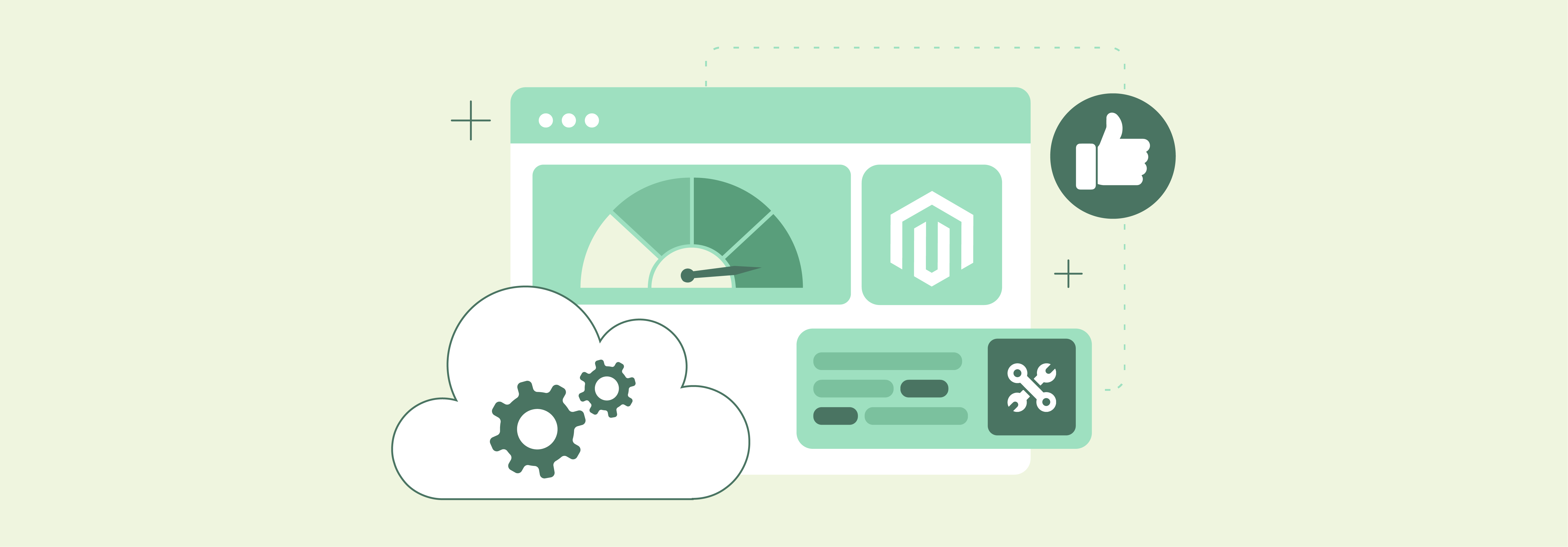
The adoption of serverless architectures, such as Magento Headless, will keep rising, enabling you to run applications without managing servers. A headless Magento store separates backend commerce functions, like order processing and inventory management, from the frontend presentation layer.
This setup allows businesses to utilize Magento's robust backend capabilities while employing a custom UI for displaying products and multimedia content. This architecture allows for automatic scaling and billing based on actual usage, making it cost-efficient and reducing operational overhead.
4. Edge Computing
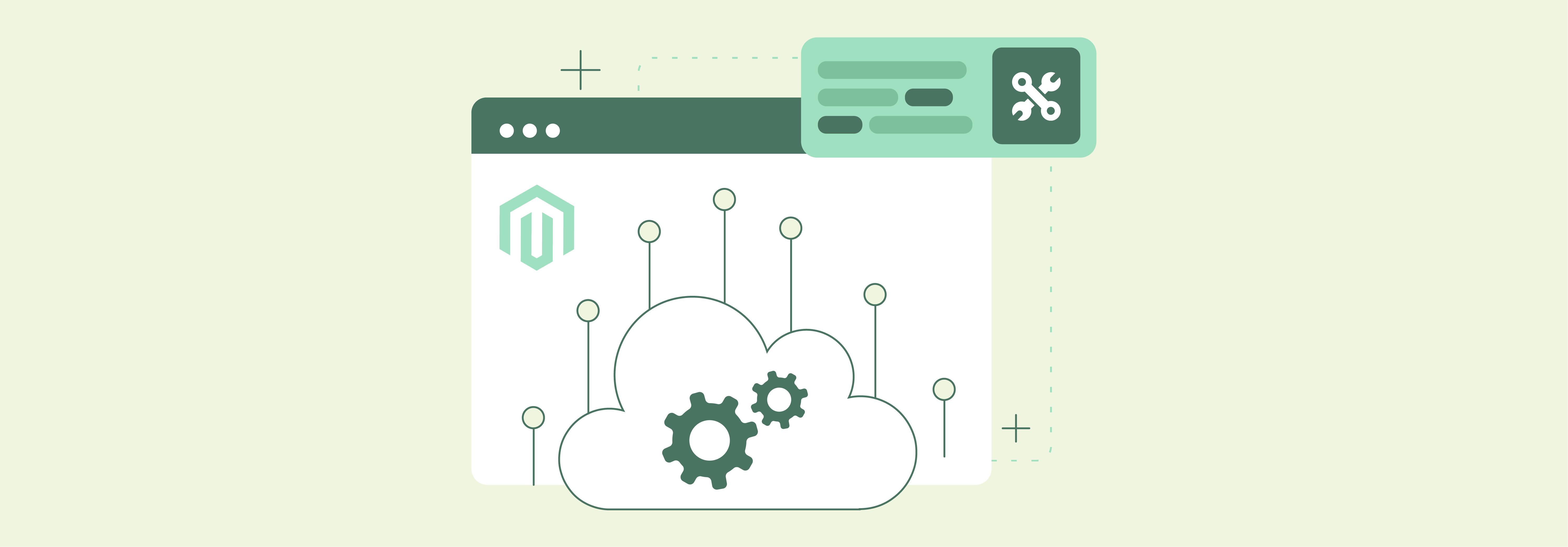
Edge computing is a distributed computing paradigm that brings computation and data storage closer to the data sources. It aims to reduce latency, save bandwidth, and improve response times by processing data near the network's edge. It is where the data gets generated in a network and doesn’t require relying solely on a centralized data-processing warehouse.
For Magento hosting, edge computing can significantly enhance the user experience by speeding up content delivery and application responsiveness. Merchants can leverage edge distribution for faster loading speeds, improved dynamic content handling, and real-time interface/experience personalization for users, regardless of their geographic location.
FAQs
1. Can Magento enterprise effectively run on shared hosting plans?
Magento Enterprise can run on shared hosting plans, but it's not ideal due to resource limitations and potential performance issues. Magento recommends more robust hosting solutions like dedicated or cloud hosting for optimal performance.
2. What are the essential hosting services for the Magento enterprise platform?
To choose the best enterprise hosting plan for a Magento store, look for providers that offer dedicated resources and scalability. Also, emphasize Magento-specific optimizations, managed services, strong security features, and expert Magento support by leading Magento hosting providers.
3. How can I choose the best enterprise hosting plan for my Magento store?
Magento Enterprise requires hosting that supports PHP and MySQL and requires enough resources (CPU, RAM, storage) to handle its heavy workload. SSL for security, SSH access for management, and a CDN for speed are also recommended. Choose a plan with Linux x86-64, Apache 2.4, NGINX 1.x, and MySQL 5.7 or 8.0 to ensure compatibility
4. Are there any Magento enterprise-specific considerations for installing Magento on shared hosting?
Installing Magento Enterprise on shared hosting may lead to performance issues due to resource limitations and security concerns. Still, if there are budget constraints, choosing hosting providers that provide Apache 2.4 or NGINX 1.x web servers is advisable to ensure smooth functionality.
5. How does Magento Enterprise hosting differ from standard PHP hosting?
Magento Enterprise hosting differs from standard PHP hosting by requiring more server resources and specialized Magento support. Enterprise-friendly partners facilitate this by providing advanced security measures and performance optimizations to support large-scale Magento e-commerce hosting operations.
6. What features should I look for in a hosting provider to ensure my enterprise platform is secure?
For a secure enterprise platform, look for a hosting provider offering robust firewalls, SSL certificates, DDoS protection, and malware scanning. PCI-compliant hosting facilitates safer transactions and regular backups aid in data preservation.
7. Can I scale my Magento enterprise hosting to handle increased traffic?
Yes, you can scale Magento enterprise hosting with cloud hosting or VPS hosting plans. Look for tailored options that easily handle increased traffic, ensuring your Magento store remains fast and reliable during traffic spikes.
8. Is cloud-based hosting a viable option for Magento enterprise?
Cloud-based hosting is a viable option for Magento Enterprise. Cloud servers offer greater flexibility, scalability, and reliability than standard shared/dedicated servers. Providers specialized in Magento cloud hosting configure and optimize based on Magento storefront performance and security needs.
9. What are the benefits of choosing a specialized Magento Enterprise over general e-commerce hosting solutions?
There are diverse benefits to choosing a hosting provider specializing in Magento Enterprise over general e-commerce hosting. Enterprise partners provide tailored optimizations for Magento, expert Magento support, and enhanced security measures. Explicit performance optimizations lead to better site reliability and customer experience.
Summary
Magento enterprise hosting partners provide the best hosting solutions to rapidly scale your e-commerce business. Choosing the optimal solution requires vetting different hosting plans against your exact growth prospects. Managed Magento Hosting can facilitate peak performance customizations for your Magento store.



